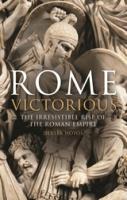
I.B. Tauris (2019) h/b 272pp £25 (ISBN 978178062746)
Another history of the Roman Empire? My shelves groan under successive tomes of sweeping authority, often reflecting the times in which they were written: anti-imperialist, anti-American, even anti-Britain.
For critics it certainly isn’t the celebrated Python legacy of sanitation, medicine, education, public order and roads. Rather, it’s the ruthless suppression of resistance, the cruelty, the forced slavery, the ceaseless plunder, the endemic corruption.
Here is a much shorter, rather dispassionate take that asks the right questions. What was so unique about the Roman Empire that it lasted so long? How did one small city on the Tiber bring several hundred years of peace and stability to a world of continuous tribal fighting from Britain to the Crimea, from the Baltic to Ethiopia? Why was it the only empire in history to have bound together the peoples of three continents, Europe, Africa and Asia, into a single political system combining a common rule of law with freedom of religion?
Was this all planned? Was there an imperialist strategy from the start? Or was Rome’s expansion essentially defensive, built piecemeal and gradually? H. doesn’t leap to judgement. Rather, he carefully surveys the beginnings of empire as Rome extended its reach up and down the Italian peninsular and into both western and eastern Mediterranean. He paints a more nuanced picture as the Republic became more territorial (the terms provincia and imperium originally had no geographical meaning).
In the West, Carthage, Spain, Portugal and later Gaul were the targets. Yes, each was an opportunity for plunder and gloria; certainly there was jealousy of Carthage’s prosperity. But these, and forays eastwards into Macedon, Cilicia and Syria, can also be understood as a search for security: only Carthage was a direct external threat to the Italian mainland.
Plunder and the need for gloria were certainly important: H. emphasizes repeatedly the opportunities for enrichment. But trade itself (and stopping piracy) must have mattered no less for being ignored by the poets and historians. Revenues from mining, agriculture and slavery were for the benefit of the Roman people, not the empire itself. Privatised tax collection, levies and freeports were all commercial instruments, bringing revenue to the central state as well as enriching its governors and legates along the way (each of the first triumvirate Pompey, Caesar, and Crassus became the equivalent of today’s billionaires). This was a well-financed superpower.
By Caesar’s death in 44 BC Rome already ran 16 provinces on three continents, stretching from Gaul to Syria. But it was a patchwork quilt, opportunistic rather than designed, new territories described variously as being in arbitratu dicione potestate amicitiae populi Romani. The next hundred years saw a more systematic and strategic approach. Wars and conquests were driven by the need for external security and internal control.
Augustus doubled the empire’s size: orbem terrarum imperio populo Romano subjecit, adding finitimae gentes quae non parerent imperio nostro. His poets saluted the new imperialism: Virgil prophesied imperium sine fine. But plenty of territory was in fact left alone, including much of modern Germany, Hungary and Romania, and Augustus famously warned his successor about coerecendi intra terminos imperii.
Broadly they complied, adding only Britain to the west and the lands around the Danube to the east, and contenting themselves with putting down internal revolts. Parthia was the exception, and never fitted. Trajan may have considered it essential to protecting trade routes to China and India. Cassius Dio put his finger on the strategic error, still relevant today, of that first of many Mesopotamian campaigns as ‘yielding very little, using up vast sums, and now that we have reached out to neighbours of the Medes and the Parthians rather than of ourselves, we are always, one might say, fighting the battles of those peoples’.
H. dates the end of empire technically to Caracalla’s decision in AD 212 to grant citizenship across the board: only slaves then remained subjects. But from the very start, four centuries earlier, a steadily widening citizenship was the key to steady, successful expansion. Aristides called it ‘a thing unparalleled, your magnanimous conception of citizenship’. To be a Roman citizen was to be a citizen of everywhere. Indeed from the provinces you could rise right to the very top: the emperor Severus was Libyan, Maximinus Bulgarian, Diocletian from Croatia. No modern empire matched this: H. points out that we still await an African-born President of France.
Rome’s historians themselves questioned the morality of empire: Livy wondered about the limits to ‘tolerating neither our vices nor our cures’. Yes, there was slavery, massive extortion, and widespread corruption: inscriptions to the honesty of particular governors are telling. But for about 450 years there was broadly peace and the rule of law where there had previously only been violence and continuous tribal warfare, something the empire’s critics always forget. And while later empires conquered with higher tech—gunpowder or the Gatling gun—the Romans did it all with a tough, efficient, disciplined and well-motivated military.
There was also something else, a deep underpinning of humanism. That allowed the generosity of citizenship, the process of manumission, above all freedom of religion. H. doesn’t deploy one of my favourite quotations (uno itinere non potest pervenire ad tam grande secretum: Symmachus’ request to the emperor Valerian to continue worshipping the Roman Altar of Victory alongside the Christian) but that tolerance speaks to an openness not replicated in either the Soviet Union or modern China.
The Romans we now know never ‘left’ Britain. We remain Roman in much of our language, thought and values. Understanding how one city marshalled the known world for so long will always matter.
Sir Michael Fallon
(Secretary of State for Defence 2014-17)
